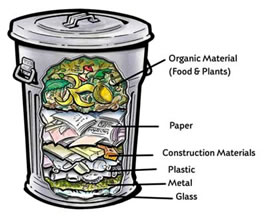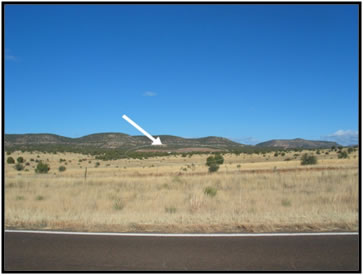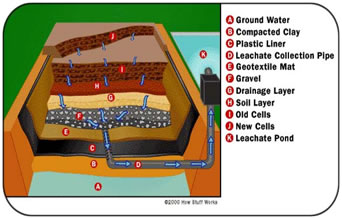
Waste Regulatory Program
The Waste Regulatory Program works to ensure compliance with environmental regulations by reducing risks associated with exposure to solid and hazardous waste and to assess, monitor, and implement pollution activities on the Fort Apache Indian Reservation. EPO encourages source reduction and works to preserve natural resource through recycling and environmental stewardship.
Tribal Solid Waste Ordinance Section 2.8 Enforcement Authority states:
- No person shall dump or otherwise dispose of any household solid waste on any lands or at any place within the jurisdiction of the White Mountain Apache Tribe other than at A TSWLF unit.
- No person shall burn household wastes.
- No person shall dump or otherwise dispose of any other waste, including construction debris, at any place within the jurisdiction of the White Mountain Apache Tribe other than at a site, location, or disposal unit authorized by the Tribal Council or other appropriate tribal authority.
- Any person who violates these conditions or regulations shall be in violation of this Chapter and shall be subject to all enforcement actions and other provisions of this Chapter. This provision is applicable regardless of whether the activity occurs on assigned or unassigned land within the meaning of the White Mountain Apache Land Code, whether the land is leased or occupied by a tribal or non-tribal entity, and regardless of the nature of any other manner in which such lands may be held or be subject to a legal interest.
- Additionally, such person may be required to pay for the clean-up and other impacts (including groundwater, soil or other damage or contamination) of the illegally deposited waste.
This program works closely with the Tribal Solid Waste Department to address solid waste issues such as recycling, illegal dumping incidents, and ensure the Tribal Geronimo Pass Landfill is in compliance with Federal regulations.
Garbage is something that everybody makes but not many people think about. What happens to your garbage after you throw it away? Does everything we put in our garbage cans really need to be there or can it be used again? How does garbage affect our health and environment?

What’s in your garbage?
All of the cans, bottles, and paper you throw away can be recycled. Wood, food, and yard clippings can be composted. Look in your trash can to see if you can find any of these things that can be recycled, composted, or reused instead of throwing away into our landfill.
Recyclables Compostables
Cans Leaves/grass
Bottles Food scraps
Plastics
Paper
Cardboard
How to Reduce your Garbage?
The Three R’s – Reduce, Reuse, and Recycle – teaches us how we can think about our garbage in a new way and help our Tribal lands.REDUCE
This “R” means you stop waste before it starts!
REUSE
This “R” means you can use an item over and over instead of throwing it away.
- Use both sides of a sheet paper before recycling it.
- Hold a yard sale or donate items you don’t want anymore.
RECYCLE
This “R” means that something old is remade into something new.RECYCLE at home is EASY! If you don’t have a recycling program, ask us how you can start one!

Reducing waste means not creating it in the first place. Reusing means that items in good condition don’t get sent to the landfill. Sell or donate these items instead. Somebody else might be looking for just what you’re trying to get rid of!
Reducing waste and reusing saves resources, money, and space! Here are some ideas:
- Bring a reusable bag when you go shopping.
- Bring your own mug to get coffee in the morning.
- Get rid of junk mail.
- Plan a low waste birthday parties or gatherings.
- Use paper on both sides.
- Buy in bulk instead of individually packaged portions.
- Share tools with your neighbors.
- Sell or donate reusable items like clothing, toys, or books.
- Repair furniture, appliances, computers, and electronics.

What are Landfills and How do they work?
You just finished your meal at home and you throw away your uneaten food, paper plates, cups, utensils, and napkins into the trash can. You don’t think about that waste again.
On trash pickup day in your neighborhood, the Solid Waste Dept. workers dump the contents into a big truck and haul away. You don’t have to think about that waste again, either, but maybe you have wondered, just where that garbage ends up.
What happens to this Trash?
If trash is not recycled or reused, it is buried in our Tribal landfill.
What is a Landfill?
Landfills are not just mountains of trash – they aim to keep the community as safe as possible from harm that can be caused when the garbage rots.
Landfills bury the trash so it will be kept dry and will not be in contact with air. Under these conditions, trash will not decompose much. When trash doesn’t decompose, it stays buried in the ground for a long, long, time.
Parts of a Landfill:
- Bottom liner system – separates trash and “leachate” from groundwater.
- Cells – spaces where trash is stored within the landfill.
- Storm water drainage system – collects rain water that falls on the landfill.
- Leachate collection system – collects water that has drained through the landfill itself and contains pollution.

Household Hazardous Waste:
Many household products contain chemicals that can harm your family and the environment. Some may be safe while in use, but can contaminate water and soil when improperly disposed of.Here is a link to House Hold Hazardous Waste Guide for Tribal Members.
Top 10 Household Hazardous Wastes.
Please NEVER dispose of the following items in the garbage, sink, or a storm drain:
- Paints, thinners
- Solvents
- Cleaners such as bleach, drain openers, and blue toilet cleaners
- Cooking oil/grease
- Pesticides
- Fertilizer and other garden chemicals
- Motor oil and filters
- Antifreeze and other auto products
- Household batteries
- Auto batteries
- Aerosol (spray) cans
- Sharps such as needles, razors, and syringes
- Fluorescent light bulbs
- Electronic waste like old TVs, computers, and cell phones
- Thermometers, thermostats, and other mercury containing items
Call our office about where you should take these items.